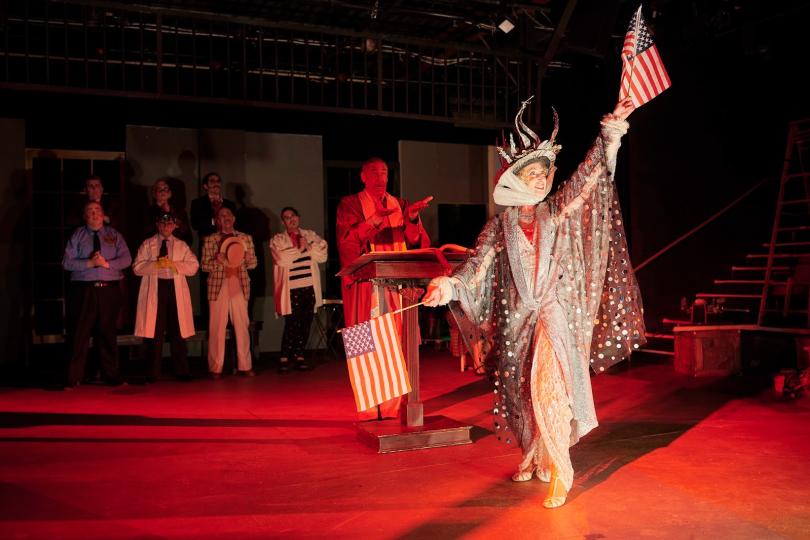Who amongst us would say “no”?

Frank Theatre is closing its 30thAnniversary season with a legendary piece: Marc Blitzstein’s The Cradle Will Rock, which was produced, though famously almost not performed, in 1937 by the Federal Theatre Project, directed then by Orson Welles. (Seehttp://marc-blitzstein.org/work/the-cradle-will-rock/).One of the many pro-union plays and musicals of that period, it has clearly stood the test of time far better than most, and remains, in many ways, as timely as it did 80 years ago. Frank originally presented this historical “play in music,” as Blitzstein liked to call it, in the vacant Sears building in 2003. I finally got to see the rebooting last Saturday and I found it dazzling. This exquisitely staged and performed show runs only through this coming Sunday; if you can get tickets, you should go. It’s socially progressive, entertaining and intelligent musical theater at its finest.
What is distinctive about the play, and perhaps the reason (aside from Blitzstein’s musical genius) why it has lasted while so many other pro-union, socialist-bending plays of the period are now forgotten, is its sophisticated analysis of cause and of blame. Veering from the standard-fare proletarian plays of the era, Cradle expands its focus from the venality and greed of wealthy industrialists to the myriad ways that people on different social levels can be tempted to “sell out”. Set in the fictional town, “Steeltown USA,” Cradle introduces us to the sadistic owner/manager of the steel mill, “Mr. Mister” (JC Cutler) using every means possible (including violence) to prevent his workers from forming a union.
Some background: Blitzstein apparently based the character on the real-life union-buster, Tom Girdler, the chair of Republican Steel, who hired spies and thugs and bribed the police to keep the company town of Aliquippa union-free. In 1937, the tension between labor and management came to a pitch and resulted in violent battles between strikers and police. While Blitzstein started writing the play in 1936 (the opening scene was written even earlier as a sketch for another show), the background of the political turmoil generated great interest in NY, where nearly eighteen thousand tickets were sold in advance of the scheduled June 1937 opening. It also led the government to close down performances of “new” FTP plays until July 1st. Blitzstein, Welles and Producer John Houseman refused to delay the opening and the rest is theater history that you can read about here (http://marc-blitzstein.org/work/the-cradle-will-rock/.))
At the outset of the play, the Steeltown police, under Mr. Mister’s influence, have been instructed to arrest anyone who appears to be a union-supporter, but two of the dithering coppers have accidentally arrested a collection of various influential citizens who are part of Mister Mister’s so-called “Liberty Committee.” Also arrested is a prostitute, Moll (Kate Beahen) and a fallen-on-hard times, alcoholic pharmacist, Harry Druggist (JP Fitzgibbons). Harry explains to Moll that everyone present, especially the “prominent” citizens -- representing politicians, journalists, doctors, artists, and the clergy (Joe Nathan Thomas is excellent as Reverend Salvation) – are the real “prostitutes” (in the language of the play): they have all sold themselves – body and soul -- to Mr. Mister.
Cradle keeps driving home that without the cooperation of the middle-class enablers, the rule of plutocrats would be vastly harder. Blitzstein shows the “Misters” to be ruthless and exploitive, but, with one notable exception, they are not stupid. They know how power works. What is more, they don’t hide it. For the most part they meet little resistance from those they use their money and influence to bend to their will. Not for a moment do they pretend to themselves or to others that the adulation and compliance they receive are anything other than bought. We see one startling assertion of raw power, for instance, in the middle of the song, “Art for Art’s Sake” (an ethos which Blitzstein utterly rejects), a three-way tango between Mrs. Mister (Molly Sue McDonald) and the play’s two artist figures (Hector Chavarria and Scotty Reynolds), jockeying over each other to slavishly fawn on their patroness. At the height of the festivities, Mrs. Mister announces that she knows the artists are only flattering her because she is rich, and they want her money. Mr. Mister too seems to understand that maintaining power requires forcing those who compromise themselves to acknowledge their complicity. When later in the play, he bribes Dr. Specialist to alter his report on a fatally injured worker, he mocks the doctors’ pretense of piety by calling himself a “bogeyman.” You can project all the evil of society onto me, he seems to say, but in cooperating you certainly bear some part of the blame for perpetuating social injustice.
In fact, the only characters who do not fold under the pressure of Misters’ power or those of his minions are Moll, who at risk of arrest refuses to take corrupt copper, “Dick” (Carl Schoenborn) as her client, Stevie (Dave Wasserman), the young pharmacist’s son, and Larry Foreman the union organizer (Schoenborn again).
The “notable exception” to the otherwise smart or at least undeceived Mister clan, and the Trump character in the play (there always seems to be one if you look closely) is Mister Junior (Sasha Andreev, great in a juicy role), a grotesque: an almost impossibly ignorant, grossly appetitive, vile egomaniac. Think of an adolescent version of Ubu Roi. Junior is so out of control that father Mister bribes a newspaper man, Editor Daily (Bob Beverage), to place him in a job far away from Steeltown. One of the highlights of the show is the richly satirical, pun-laden, and generally hysterical number (“Honolulu”) in which Editor Daily, along with Mr. and “Sister Mister” (Chelsea Newhard), seduce Junior into accepting the gig with promises of wild sex and a journalist’s “luxurious” lifestyle. (Kudos to the lovely ukulele accompaniment and to Knox’s very clever use of the hammock in this scene and others.)
There is understandably more than a hint of German Expressionism and of course, Brecht (think “Threepenny Opera”) in this production of The Cradle Will Rock. The gaudy makeup and wigs, reflecting that aesthetic, will entrance some and put off others, just as they did decades ago but they well suit a play whose characters are mostly Brechtian-style allegories. The minimal set (just the hammock, a few benches and an upstage night court holding pen) is well supplemented by Kathy Kohl’s gorgeous, bright orange-and-yellow toned, witty, cartoonish (in a good way) costume design. Certain of Kohl’s period touches sometimes give the play a haunting quality. Beahen, for instance, is made to look just like Lotte Lenya (who actually performed the opening ballad several years before Blitzstein incorporated it in his musical.).
The success of the production clearly owes much to the brilliant direction of Wendy Knox, who is the Twin Cities’ foremost expert in interpreting Brecht. Here she has her actors perform in the heightened, classically Brechtian, Weimer-era expressionist style, and they deliver with skill and aplomb. Full confession: I love this style of acting with its broad gestures, farcical, artificial touches and everything just marvelously overblown.
The stellar cast are all at the top of their game. The ensemble work is impressive, and the blocking and choreography are all performed with a precision that is made to appear effortless. Beahen’s vocals are exquisite: rich and delicate and filled with pathos. The comic genius of dashing Chavarri as painter Dauber (yep) and Reynolds as dapper composer-musician Yasha are worth special notice, and Fitzgibbons gives a strong, compelling performance as the fallen, remorseful Harry Druggist.
For some, the questions the play raises about taking money may hit close to home, not only in politics, but also in academia, the media, and in the theatre, etc. We are extremely lucky to have exceptionally generous arts funding in this state. Yet as we watch theaters close and attendance decline, the practical pressures can become very strong to accept funding from any available source. Cradle forces one to ask: if the necessary funding were to come from a corporation or foundation that politely asks for certain messages to be “toned down,” who amongst us would say “no”?
Of course, The Cradle Will Rock directs its vitriol first and foremost to the greed and venality of the ruthless industrialists who relentlessly suppressed union activity to keep workers powerless. At the same time, it aims to offer broader points, not least how systematic corruption leads to systematic inequality: the way that the continued centralization of power and the exploitation of the working class is sustained by millions of Faustian bargains made by people who do have some agency, every day. Unusually for a pro-union play, the majority of characters in Cradle represent various types from the intellectual and middle classes. There are not that many working-class heroes – I counted just Larry Foreman, Gus (Cameron Reeves), and Ella Hammer (Maria Asp), the sister of an injured steelworker. (Moll, who is the moral center of the play, is thoroughly destitute.) As in Brecht’s Mother Courage, Cradle reflects on how victims are in part complicit in the process that victimizes them (whether wittingly or not). Blitzstein’s play wishes to wake us up not only to the necessity of disciplined, collective resistance but to the need for scrupulous moral honesty and integrity on the part of all individuals who seek a more just society. Few organizations embody those values more than the Frank, which has devoted itself for 30 years now to creating the theater of social change.
The Cradle Will Rock is biting, intelligent, musically transporting political theater, powerfully rendered by Wendy Knox and the company she has assembled. It’s late notice, I know, but if you possibly can, get over to the Gremlin and catch one of the final performances this weekend.
Addendum: Although this does not touch directly on the show itself, there are some peripheral aspects of the production that are a little troubling. The “Resource Guide” created for the play (and sold at in the lobby), while containing some good essays on the labor history surrounding the play, makes some quite poor choices of inclusion and exclusion: e.g., a discussion of Blitzstein that significantly overstates his “elitist” and “privileged” background, implies that his political sympathies gravitated from pro-capitalist to socialist, and is silent about his Jewish heritage (which is important to understanding certain passages in The Cradle Will Rock). In fact, Blitzstein was raised in a socialist household that was filled with and sometimes sheltered immigrants and that was steeped in Marxism mixed with a love for the performing arts. Blitzstein’s father Sam, a one-time vaudeville performer, who later joined the family business of an “immigrant bank,” reared his son on the Daily Worker, meetings of the Socialist Literary Society and introduced him to left-wing artists and writers, like Maxim Gorky, who the Blitzsteins hosted when the great Russian playwright visited Philadelphia. Later in life, Blitzstein credited his father, who went bankrupt in 1930, for always encouraging him to devote his musical talents to making socially progressive art. (See Mark Blitzstein: His Life, His Work, His Art,by Howard Pollack andThe Composer Who Rocked the Cradle, by Benjamin Ivry, The Forward, 8/24/12:12.) Another piece proves “information” about Henry Ford’s 1915 “Peace Ship” that says nothing about Ford’s virulent anti-Semitism or his ownership of a newspaper purposed to disseminate anti-Semitic libels, nor of Ford’s active support for the Nazi government (e.g, of the 350,000 trucks used by the motorized German Army as of 1942, roughly one-third were Ford-made). Aside from its omissions, the essay gives readers no clue as to why Blitzstein’s 1937 play takes a stab at the hypocrisy of Ford’s “Peace Ship” in the context of a scene about the corruption of the press. None of this is to detract from the production itself, which is sublime.




